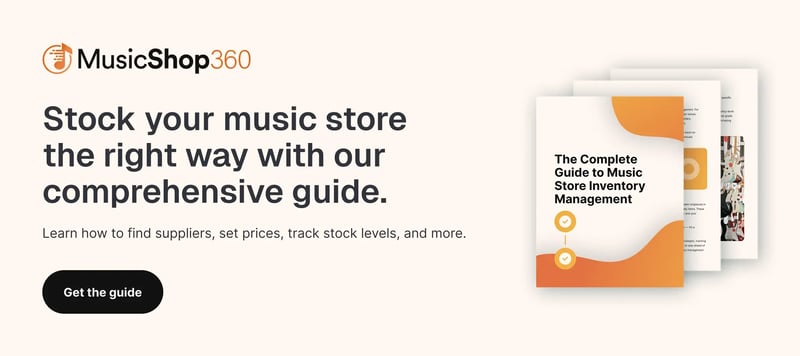
Managing inventory in a music shop comes with its own challenges.
You’re juggling expensive instruments that may sit on the wall for months, fast-moving accessories that customers expect to always be in stock, seasonal rental chaos when school programs start and end, and the added complexity of consignment, trade-ins, and repair parts.
Get it wrong, and you’ve got too much capital tied up in slow movers or you’re drowning in SKUs you can’t keep straight.
Get it right, and your shop runs smoother, your cash flow improves, and your customers stay loyal because you always have what they need.
In this blog, we’ll share 10 steps to help you master music shop inventory management, complete with practical strategies and real-world solutions built for music shops like yours.
Let’s dive in.
1. Get a POS System That Understands Music Shop Inventory Management
First things first, look at your point of sale (POS) system.
A Square terminal might work fine for a coffee shop, but it's going to fall apart when you're trying to track serial numbers, manage rental contracts, and deal with MAP pricing rules all at once.
You need something that can handle a $6,000 Martin acoustic the same way it handles a box of guitar picks. Look for:
- Room for unlimited SKUs
- Purchase orders built in
- Rental tracking
- Serial number logging
- MAP enforcement
Get this right first. Everything else depends on it.
Related Read: Where Do Music Stores Get Their Inventory? + 5 Tips for Managing Yours
2. Track Every Instrument’s Serial Number
Once your music store POS is in place, the next non-negotiable is serial number tracking.
Yes, logging them is tedious, but here’s why you do it:
- That parent who calls three months later asking about the dented rental trumpet? You’ll have the answer.
- The customer who needs warranty info on their amp from 2022? You’ve got it.
- Something gets stolen? Your insurance claim is ready to go.
The key is to make it part of your process — nothing hits the sales floor until the serial number is logged. That way, every instrument has a paper trail from the moment it enters your store.
3. Manage Seasonal Rental Chaos
Every August and September, school band programs bring a tidal wave of rentals and returns.
Without a system, it’s easy to lose track of who has what instrument, whether returns are complete, and if payments are current.
Get your rental contracts tied into your POS. With everything connected, you’ll know exactly:
- What's out vs. what's sitting in the back
- Who forgot to return their instrument
- Which rental units are getting too beat up to send out again
This level of clarity keeps parents happy, staff sane, and your rental fleet profitable.
4. Know When to Markdown
Every shop has “wall hangers” — like that expensive guitar or boutique amp that’s been collecting dust.
The question is: When do you mark down products, and by how much, without violating vendor MAP restrictions?
Here's a rough timeline:
- 90 days: Try merchandising tactics first — move it, bundle it, or highlight it differently.
- 6 months: If it still hasn’t sold, offer a small or limited discount (while staying within MAP rules).
- 9-12 months: If it’s still sitting there, it’s time for heavier markdowns or creative liquidation (like trading with another retailer or selling to a secondary market).
Your POS reporting will show which items aren’t turning, so you can act before they tie up too much capital.
5. Get Smart With Trade-Ins & Consignments
Used gear is a win-win. Customers love affordable options, and you build loyalty. But if you’re not careful, it’s easy to overpay on trade-ins or underprice consignment gear.
Your POS should help by:
- Tracking trade-in values vs. resale values
- Making payouts easy for consignors
- Flagging if you’re too close to new stock pricing
That way, you’re making fair deals without cutting into your own margins.
6. Keep Repair Parts Under Control
If your repair tech has to dig through three bins to find the right clarinet pad, you’ve got a problem. If you order springs every month because nobody knows what’s already in stock, that’s money down the drain.
The fix is simple: treat parts like inventory. Here’s how:
- Give them SKUs
- Put them in labeled bins
- Use barcodes if you can
With this system, your repair department runs faster, you stop duplicating orders, and you’ll know exactly when it’s time to restock.
Related Read: Where To Source Musical Instrument Repair Supplies: 9 Top Providers
7. Build Stronger Vendor Relationships
MAP pricing means you can’t just slash prices whenever you want. That makes your vendor relationships really important.
Don’t go in saying, “I feel like we’re doing pretty well with your brand.” Instead, show them your sales data.
When vendors see you’re moving their gear, you have leverage to ask for:
- Better payment terms
- Cheaper shipping
- First dibs on new models
Solid vendor relationships give you flexibility — and flexibility is gold when you’re trying to balance high-value gear with everyday essentials.
8. Always Stock the Essentials
Nobody’s coming back if you’re out of guitar strings or reeds. Accessories are the bread and butter of your shop, and you can’t afford to let them run dry.
Set min/max levels in your POS so the system automatically reorders when you hit your threshold. That way, your shelves never look empty, and you’re not sitting on a year’s worth of inventory either.
9. Rotate Seasonal Inventory
Do marching drums sell like crazy in August? Ukuleles disappearing in December?
If you don’t rotate your seasonal stock in and out, you’ll either miss sales opportunities or sit on dead stock until next year.
Your sales history can guide you on when to:
- Bring seasonal items forward before the rush starts
- Pack them away when the season ends
- Use signage to highlight what’s in season so customers know what’s hot right now
Your floor space is too valuable to waste on gear nobody’s buying this month.
10. Train Your Team Before the Rush
Your system can easily fall apart if your staff isn’t confident using it. Rental season, holiday shopping, and trade-in weekends are not the time for “Wait, how do I do this again?”
Invest in training ahead of time. Cover:
- Checking in serialized inventory
- Processing rentals and returns
- Handling trade-ins
- Using mobile scanners during counts
When your team knows what they’re doing, everything runs smoother. When they don’t, you’re the one fixing problems at 9 p.m.
Related Read: Training Staff in Your Music Store: 7 Tips for Success
Master Music Shop Inventory Management With Music Shop 360
With the right system and a few solid processes, you’ll keep your shelves stocked, your cash flow healthy, and your customers coming back.
Music Shop 360 is an all-in-one POS system built specifically for music retailers. It handles serialized instruments, rentals, trade-ins, consignments, and repairs in one system.
Here’s how it can help you with music shop inventory management:
- Track serial numbers, rentals, and repairs: Manage everything in one place without using multiple systems.
- Follow MAP pricing rules: Discount items while staying compliant with vendor agreements.
- Keep essentials in stock: Set minimum levels for strings, reeds, and cables, and let the system reorder automatically when stock runs low.
- Manage rental season: Link rental contracts to items, customers, and payments. See what's checked out, what's overdue, and what needs servicing.
- Sell online and in store: Sync with Reverb, connect lessons through My Music Staff, and link to QuickBooks for accounting.
Ready to see how it works firsthand? Schedule a demo with one of our experts today.




 by
by 


